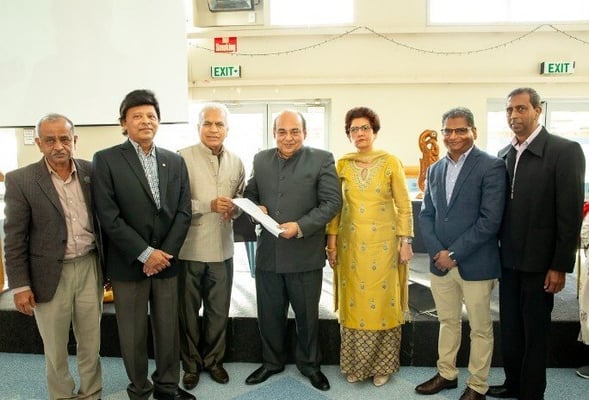‘Diaspora should be at heart of all bilateral engagement’

Auckland’s Indian diaspora gave a warm and touching farewell to High Commissioner of India to New Zealand His Excellency Sanjiv Kohli and his wife Dr Ruma Kohli. High Commissioner Kohli finishes his three-year term in the country next month.
The felicitation was held at the Mahatma Gandhi Centre on Sunday 7 April.
The fact that this was the first time that a public farewell function was organised for an outgoing Indian envoy is a measure of MrKohli’s immense popularity in the Indian community across New Zealand.
In his usual inimitable style, Mr Kohli spoke extempore, with no notes – an enviable quality that he has become known for and which several speakers at the farewell admiringly commented upon.
Mr Kohli’s career at the Indian Foreign Service began with an assignment that has ended up in the record books and a successful film. He recounted how as a 24-year-old he was first posted to Kuwait and, “As destiny would have it I was there when the Gulf crisis happened.”
The young engineering graduate from the Punjab Engineering College was called upon to be part of one of the biggest humanitarian evacuations in history. He stayed on the Iraq-Jordan border for 50 days, sleeping in a teashop as he awaited the opportunity to evacuate 170,000 Indians from the war zone. “The task of getting 170,000 of our own people home from a crisis-ridden place kept us going,” he said.
New Zealand was Mr Kohli’s first posting as High Commissioner. Prior to this appointment, he had stayed in Delhi for a few years to attend to family matters. He had a list of countries he could have chosen to go to but New Zealand came up trumps, especially as the family was “very keen.”
Speaking of his early days in New Zealand, Mr Kohli said he started out with a clean slate in the sense that he had no notes from the predecessor, “I had no notes about stakeholders, roles, people to mingle with and to avoid,” he said with the characteristic twinkle in his eye, to muffled laughter from the audience.
Within two months, then Indian President Pranab Mukherjee’s official visit to New Zealand was announced and he had to coordinate everything that had to do with the forthcoming Presidential visit. “That visit opened new opportunities in the India-New Zealand relationship like never before,” he said.
“I started my own journey with the New Zealand Indian community at a large diaspora event in Auckland. I found people receptive. There was a perception that the High Commission kept a distance from the community. There was a problem of perception,” he said.
Mr Kohli said he felt that there was a strong desire in the community to work together with the High Commission: “It just needed the right move and we extended a hand. We moved a foot, you moved a metre – without your support, we couldn’t have accomplished what we have in the past three years,” he said.
“As we worked together, so many came to work with us. There were so many, I can’t take names. You are not just an asset to New Zealand but also an asset for India. Diaspora should be centre-stage of any bilateral engagement. Diaspora should be the voice for India as much as it should be for the country they are living and working in.
“As a High Commissioner, though I speak on a behalf of a billion people in India, equally I speak on behalf of 200,000 of our own people here, much more than the billion people back home,” he said drawing lusty applause from the audience. “The diaspora should be at the centre of all bilateral engagement.”
Mr Kohli said Auckland had been a second home “in terms of the number of nights spent outside Wellington.”
Recalling the affection and warmth he had received from Aucklanders, Mr Kohli became emotional stopping briefly to collect his thoughts before continuing: “It has been a moving experience, I have mixed emotions – I feel humbled, proud, sad, leaving behind people who have become friends. I’m grateful to each one of you.”
Though the High Commission did accomplish much in the three years, there were unfinished tasks too, he said. “But we tried our best.” Disappointments included a high number of accidents involving young Indian people. “We need to create the right awareness – it’s a work in progress. There also more that needs to be done for women.”
One of the highlights of his tenure in New Zealand was the setting up of the Consulate of India in Auckland with Bhav Dhillon as the Honorary Consul General, Mr Kohli said.
“There was a longstanding demand for an office in Auckland. It took me six-seven months for approval from Delhi. First, you need the approval to have a consul. Then you suggest names. Took a year for it to happen,” he said. “I and the community are happy with the work he’s done. It’s great that despite being a busy industrialist he finds the time, resources, managing competing demands… thank you for that.”
He acknowledged the great relationship he had developed with MPs of Indian origin as Labour’s Priyanca Radhakrishnan and National’s Kanwaljit Bakshi shared the dais with him. Also on the dais were Mrs Kohli, Honorary Consul Bhav Dhillon, Indian community leaders Bhiku Bhana, Narendra Bhana, Jeet Sachdev and Harshad Patel, who all spoke on the occasion.
Several community association leaders individually felicitated Mr and Mrs Kohli.
Auckland’s Indian diaspora gave a warm and touching farewell to High Commissioner of India to New Zealand His Excellency Sanjiv Kohli and his wife Dr Ruma Kohli. High Commissioner Kohli finishes his three-year term in the country next month.
The felicitation was held at the Mahatma Gandhi Centre...
Auckland’s Indian diaspora gave a warm and touching farewell to High Commissioner of India to New Zealand His Excellency Sanjiv Kohli and his wife Dr Ruma Kohli. High Commissioner Kohli finishes his three-year term in the country next month.
The felicitation was held at the Mahatma Gandhi Centre on Sunday 7 April.
The fact that this was the first time that a public farewell function was organised for an outgoing Indian envoy is a measure of MrKohli’s immense popularity in the Indian community across New Zealand.
In his usual inimitable style, Mr Kohli spoke extempore, with no notes – an enviable quality that he has become known for and which several speakers at the farewell admiringly commented upon.
Mr Kohli’s career at the Indian Foreign Service began with an assignment that has ended up in the record books and a successful film. He recounted how as a 24-year-old he was first posted to Kuwait and, “As destiny would have it I was there when the Gulf crisis happened.”
The young engineering graduate from the Punjab Engineering College was called upon to be part of one of the biggest humanitarian evacuations in history. He stayed on the Iraq-Jordan border for 50 days, sleeping in a teashop as he awaited the opportunity to evacuate 170,000 Indians from the war zone. “The task of getting 170,000 of our own people home from a crisis-ridden place kept us going,” he said.
New Zealand was Mr Kohli’s first posting as High Commissioner. Prior to this appointment, he had stayed in Delhi for a few years to attend to family matters. He had a list of countries he could have chosen to go to but New Zealand came up trumps, especially as the family was “very keen.”
Speaking of his early days in New Zealand, Mr Kohli said he started out with a clean slate in the sense that he had no notes from the predecessor, “I had no notes about stakeholders, roles, people to mingle with and to avoid,” he said with the characteristic twinkle in his eye, to muffled laughter from the audience.
Within two months, then Indian President Pranab Mukherjee’s official visit to New Zealand was announced and he had to coordinate everything that had to do with the forthcoming Presidential visit. “That visit opened new opportunities in the India-New Zealand relationship like never before,” he said.
“I started my own journey with the New Zealand Indian community at a large diaspora event in Auckland. I found people receptive. There was a perception that the High Commission kept a distance from the community. There was a problem of perception,” he said.
Mr Kohli said he felt that there was a strong desire in the community to work together with the High Commission: “It just needed the right move and we extended a hand. We moved a foot, you moved a metre – without your support, we couldn’t have accomplished what we have in the past three years,” he said.
“As we worked together, so many came to work with us. There were so many, I can’t take names. You are not just an asset to New Zealand but also an asset for India. Diaspora should be centre-stage of any bilateral engagement. Diaspora should be the voice for India as much as it should be for the country they are living and working in.
“As a High Commissioner, though I speak on a behalf of a billion people in India, equally I speak on behalf of 200,000 of our own people here, much more than the billion people back home,” he said drawing lusty applause from the audience. “The diaspora should be at the centre of all bilateral engagement.”
Mr Kohli said Auckland had been a second home “in terms of the number of nights spent outside Wellington.”
Recalling the affection and warmth he had received from Aucklanders, Mr Kohli became emotional stopping briefly to collect his thoughts before continuing: “It has been a moving experience, I have mixed emotions – I feel humbled, proud, sad, leaving behind people who have become friends. I’m grateful to each one of you.”
Though the High Commission did accomplish much in the three years, there were unfinished tasks too, he said. “But we tried our best.” Disappointments included a high number of accidents involving young Indian people. “We need to create the right awareness – it’s a work in progress. There also more that needs to be done for women.”
One of the highlights of his tenure in New Zealand was the setting up of the Consulate of India in Auckland with Bhav Dhillon as the Honorary Consul General, Mr Kohli said.
“There was a longstanding demand for an office in Auckland. It took me six-seven months for approval from Delhi. First, you need the approval to have a consul. Then you suggest names. Took a year for it to happen,” he said. “I and the community are happy with the work he’s done. It’s great that despite being a busy industrialist he finds the time, resources, managing competing demands… thank you for that.”
He acknowledged the great relationship he had developed with MPs of Indian origin as Labour’s Priyanca Radhakrishnan and National’s Kanwaljit Bakshi shared the dais with him. Also on the dais were Mrs Kohli, Honorary Consul Bhav Dhillon, Indian community leaders Bhiku Bhana, Narendra Bhana, Jeet Sachdev and Harshad Patel, who all spoke on the occasion.
Several community association leaders individually felicitated Mr and Mrs Kohli.









Leave a Comment